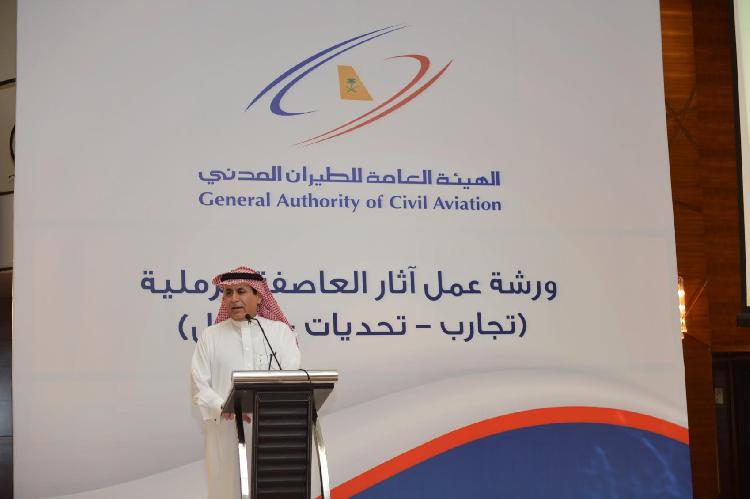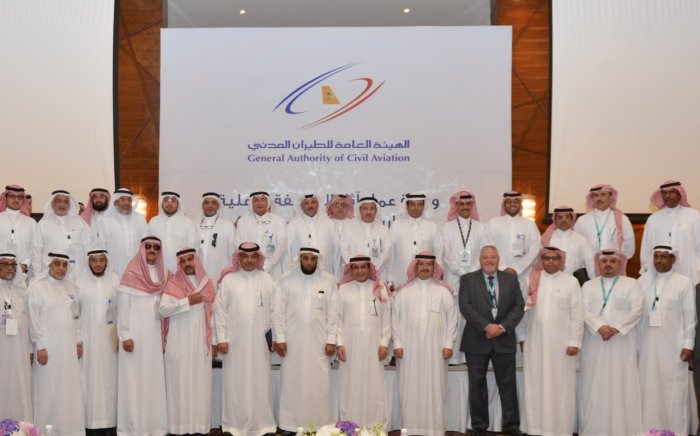
GACA ORGANIZES WORKSHOP WITH THEME "EXPERIENCES, CHALLENGES, SOLUTIONS"
Saudi Arabia’s General Authority of Civil Aviation President His Excellency Sulaiman Bin Abdullah Al Hamdan opened a workshop titled “Effects of the Sand Storm” last Monday.
The workshop aimed to study the repercussions of the recent sandstorm that disrupted air traffic in the Kingdom, identify deficiencies in dealing with similar natural events, and come up with recommendations to better handle them in the future.
The workshop was held under the theme “Experiences, Challenges, Solutions,” with participation from all civil aviation departments and national airline officials.
In the full-day workshop, Al Hamdan delivered a speech in which he outlined its content and goals and urged participants to come up with results that would enable the Kingdom’s civil transportation to avoid similar repercussions in the future.
H.E. said that such meetings are very effective brainstorming gatherings where new ideas are proposed and communication among various sectors is established, stressing that all concerned parties should partake in improving the industry.
“GACA is continuously working on implementing many initiatives, not to mention the huge projects in many of the Kingdom’s airports, which usher in a tangible leap in the quality of the infrastructure needed to provide the best possible services,” he continued.
“GACA also aims to improve the levels of courtesy in dealing with the general public and the quality of services, develop information technology-based systems that are more modern and more accurate, and move away from traditional, old-fashioned ways of doing things to a fully online environment,” he said.
Al Hamdan thanked his predecessors, underlining the importance of continuity in implementing the plans and projects they had started to develop infrastructure.
Abdulhakim Al-Allawi, Assistant to the President for Air Safety, presented a timeline of the events that accompanied the sandstorm.
He reiterated the importance of holding this and similar workshops, and the participation of all concerned parties, in coming up with the solutions and recommendations necessary to handle such circumstances better and more efficiently should they occur in the future.
Afterwards, the participants sat down for two breakout sessions: one for ground operations and support services, and the other for flight operations.
In them, they stressed the importance of adopting a more holistic approach in dealing with similar circumstances, as well as the vital need to communicate with the general public and keep them informed on a given situation, and the necessity of having unified guidelines to handle such unexpected events.
They added that the lack of comprehensive, real-time information thwarted their efforts for proper decision-making in dealing with the crisis. They underlined the importance of forming a crisis management team and new departments, one of which would be specifically tasked with enabling frontline officers to handle passengers properly, as well as meticulous, minute-by-minute cooperation with the Presidency of Meteorology and Environment (PME).
Participants also offered their suggestions for recommendations, most important of which was to have a unified crisis management guidebook that all partners would abide by, and forming a working team comprising members from all concerned public and private institutions to write out that guidebook.
They concluded with underlining the importance of improving the flow and timing of weather information to concerned departments. They also recommended that crisis management drills be held based on the guidebook, to encompass shutting down one or several airports to probe the effectiveness of the measures to be adopted.
Another recommendation was for the creation of a unified call center that would serve as a communication node for all parties, in addition to making extensive use of social media to quickly relay updated information to the general public.
Participants also pointed out that national carriers and airports must have their own crisis management plans that would include freak weather conditions, outline the factors and circumstances under which flights must be delayed, grounded or canceled, detail the persons and departments to whom authority should be delegated to make such decisions, and incorporate all that information in the flight operations handbook.
They also recommended that the Kingdom’s international airports be equipped to use Category Two (CAT II) Instrument Landing Systems (ILS) to improve the chances for safe takeoffs and landings, provide the PME with all the means necessary to help it keep up with the great improvements in the accuracy of weather forecasts the world over, and thus provide a better product, and that the guidebook include details of the scopes and limitations of responsibility and the means of communication among officials.
The GACA President then thanked the participants for their efforts to come up with solutions and ways to handle such issues.
In his closing speech, Al Hamdan said that GACA believes in full transparency in dealing with travelers, with its stated role being to serve citizens, residents and visitors to the Kingdom.
He reiterated that GACA works hard to upgrade and qualify the services offered to travelers so as to achieve the highest possible levels of comfort and luxury to citizens and residents who use Saudi airports.
The workshop aimed to study the repercussions of the recent sandstorm that disrupted air traffic in the Kingdom, identify deficiencies in dealing with similar natural events, and come up with recommendations to better handle them in the future.
The workshop was held under the theme “Experiences, Challenges, Solutions,” with participation from all civil aviation departments and national airline officials.
In the full-day workshop, Al Hamdan delivered a speech in which he outlined its content and goals and urged participants to come up with results that would enable the Kingdom’s civil transportation to avoid similar repercussions in the future.
H.E. said that such meetings are very effective brainstorming gatherings where new ideas are proposed and communication among various sectors is established, stressing that all concerned parties should partake in improving the industry.
“GACA is continuously working on implementing many initiatives, not to mention the huge projects in many of the Kingdom’s airports, which usher in a tangible leap in the quality of the infrastructure needed to provide the best possible services,” he continued.
“GACA also aims to improve the levels of courtesy in dealing with the general public and the quality of services, develop information technology-based systems that are more modern and more accurate, and move away from traditional, old-fashioned ways of doing things to a fully online environment,” he said.
Al Hamdan thanked his predecessors, underlining the importance of continuity in implementing the plans and projects they had started to develop infrastructure.
Abdulhakim Al-Allawi, Assistant to the President for Air Safety, presented a timeline of the events that accompanied the sandstorm.
He reiterated the importance of holding this and similar workshops, and the participation of all concerned parties, in coming up with the solutions and recommendations necessary to handle such circumstances better and more efficiently should they occur in the future.
Afterwards, the participants sat down for two breakout sessions: one for ground operations and support services, and the other for flight operations.
In them, they stressed the importance of adopting a more holistic approach in dealing with similar circumstances, as well as the vital need to communicate with the general public and keep them informed on a given situation, and the necessity of having unified guidelines to handle such unexpected events.
They added that the lack of comprehensive, real-time information thwarted their efforts for proper decision-making in dealing with the crisis. They underlined the importance of forming a crisis management team and new departments, one of which would be specifically tasked with enabling frontline officers to handle passengers properly, as well as meticulous, minute-by-minute cooperation with the Presidency of Meteorology and Environment (PME).
Participants also offered their suggestions for recommendations, most important of which was to have a unified crisis management guidebook that all partners would abide by, and forming a working team comprising members from all concerned public and private institutions to write out that guidebook.
They concluded with underlining the importance of improving the flow and timing of weather information to concerned departments. They also recommended that crisis management drills be held based on the guidebook, to encompass shutting down one or several airports to probe the effectiveness of the measures to be adopted.
Another recommendation was for the creation of a unified call center that would serve as a communication node for all parties, in addition to making extensive use of social media to quickly relay updated information to the general public.
Participants also pointed out that national carriers and airports must have their own crisis management plans that would include freak weather conditions, outline the factors and circumstances under which flights must be delayed, grounded or canceled, detail the persons and departments to whom authority should be delegated to make such decisions, and incorporate all that information in the flight operations handbook.
They also recommended that the Kingdom’s international airports be equipped to use Category Two (CAT II) Instrument Landing Systems (ILS) to improve the chances for safe takeoffs and landings, provide the PME with all the means necessary to help it keep up with the great improvements in the accuracy of weather forecasts the world over, and thus provide a better product, and that the guidebook include details of the scopes and limitations of responsibility and the means of communication among officials.
The GACA President then thanked the participants for their efforts to come up with solutions and ways to handle such issues.
In his closing speech, Al Hamdan said that GACA believes in full transparency in dealing with travelers, with its stated role being to serve citizens, residents and visitors to the Kingdom.
He reiterated that GACA works hard to upgrade and qualify the services offered to travelers so as to achieve the highest possible levels of comfort and luxury to citizens and residents who use Saudi airports.
Share:
ADD TO EYE OF Riyadh
MOST POPULAR
Energy Minister unveils 8 Arabian oil, 6 natural gas discoveries in Saudi Arabia
Thursday 10 April, 2025 1:56Tawuniya bags health insurance contract from Ministry of Foreign Affairs
Wednesday 9 April, 2025 10:19AIM Congress 2025 enhances investment cooperation prospects between UAE, Japan, Africa
Wednesday 9 April, 2025 10:36UAE unveils details of its national pavilion at Expo 2025 Osaka-Kansai, Japan
Wednesday 9 April, 2025 10:26SESTEK announced new Agentic AI capabilities for its customer service bots
Thursday 10 April, 2025 12:22 ×



























